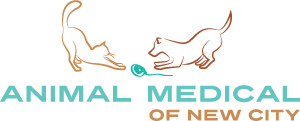Dog Feeding Basics
Dogs are as individual as people. Large, small, young or old, they all need a well-balanced diet for good health. Good nutrition is no accident; dogs of different ages and sizes have different nutritional needs. It therefore takes time and patience to learn what your dog needs to stay happy and healthy, as well as diligence and perseverance to make sure your dog eats what he/she should, rather than what he/she wants. Use the following information to help ensure that your dog gets the proper nutrition.
What Kind of Food Should I Feed My Dog?
There are three factors to consider when deciding which food is right for your pet: life stage, lifestyle, and overall condition. Life stage refers to whether your dog is a puppy (birth-1 yr), adult (1yr-6yrs), or senior (7 yrs and older). Lifestyle refers to how active or inactive your dog is normally. Overall condition refers to your dog’s overall health and body weight. In addition to these factors, the food must also meet established nutritional requirements for dogs.
The Association of American Feed Control Officials (AAFCO) is an organization that publishes regulations for nutritional adequacy of “complete and balanced” dog and cat foods. Most dog foods on the market have a label claim of meeting the minimum AAFCO requirements for dog nutrition. The higher quality dog food companies meet the requirements and perform clinical trials to ensure that dogs eating their brand of dog food remain happy and healthy.
Does Price Matter When Selecting a Dog Food?
Low cost dog food may be less expensive but it is not always a bargain. Lower quality foods may not provide optimum nutrition for your dog. High quality dog foods provide 100% complete and balanced nutrition with consistent high quality ingredients; i.e. from bag to bag or can to can, your dog will get consistent optimal nutrition. In addition, these dog foods have a higher nutrient and energy density than the lower quality foods which translates into smaller feeding portions. Therefore, the premium dog food gives you the best value while providing your dog with high quality nutrition.
How Often Should I Feed My Dog?
Puppies from weaning (generally 6 weeks of age)to 4 months of age should be fed three times daily; i.e. you feed 1/3 of their total daily requirement at each feeding. After 4 months of age, they should be fed twice daily. Most dogs should continue to be fed twice daily throughout their lifetime (although some dogs will do well on only once daily feeding). Dogs like routine, so establish a feeding schedule and stick to it. A good time to feed your dog is during family meals – this will occupy him/her while the rest of the family is eating.
How Much Should I Feed My Dog?
The amount your dog needs to eat depends on many factors including life stage, lifestyle, and overall condition (as discussed previously). Most dog foods will have feeding guidelines based on weight provided on the package. However, every dog is unique and you have to adjust the amount he or she is eating accordingly. Body condition score (BCS) is a scale that is used to assess your dog’s overall body condition. This information can be used to make the appropriate adjustments in the amount you are feeding your dog so that he or she maintains an ideal body condition.
Puppies (Just weaned to 3 ½-4 months old):
Feed 1 8oz cup/5-10 lbs of body weight/day.
Feed high quality puppy food based on breed. Smaller breeds feed a puppy food till 6 months of age. Larger breeds should be on a puppy food until 9-12 months of age.
When Do I Start Feeding My Puppy Adult Food?
Once your puppy is fully grown, evaluate your puppy’s nutritional needs, and choose the appropriate adult food.
Make the switch gradually over 3-4 days; i.e. on day 1 feed ¼ new food, ¾ old food, day 2 feed ½ new food, ½ old food, and so on, until your puppy is completely on the new
Large breed dogs have special needs due to the association between overfeeding and developmental joint problems. Feed ‘large breed’ formula foods – they contain reduced amounts of calcium, phosphorus, and fat. This helps control their rate of growth and thus promotes normal development.
Depending on the breed, start switching to adult formula dog food at 4-6 months of age.
Adult Dogs 2-6 Years of Age
Based on your dog’s nutritional needs, feed the appropriate high quality adult formula dog
Feed to maintain Body Conditioning Score of 3
Generally, most normal healthy dogs need approximately 1 8oz cup/25-30 lbs of body weight/day.
Remember that each dog is unique and you may have to adjust the amount of food you are feeding your dog based on his/her specific nutritional
Senior Dogs 7 Years and Older
Based on your dog’s nutritional needs, feed the appropriate high quality senior
Senior diets are formulated to address the specific needs of your older dog; they are lower in fat, salt, and phosphorus, and higher in fiber to increase
Adjust the amount of feeding to maintain as close to a Body Condition Score of 3
Is It Ok to Give My Dog Bones?
Many dogs, especially young dogs, have a natural instinct to chew. However, you should only give bones and chew toys that are specifically designed for dogs to safely chew such as nylabones and kong toys. Bones, especially chicken and turkey bones, can splinter and cause serious problems such as getting lodged in your dog’s mouth, constipation, or even bloody diarrhea. Round bones can get stuck around the lower jaw or lodged in the esophagus as well as fracture teeth.
Many dogs, especially young dogs,, have a natural instinct to chew. However, you should only give bones and chew toys that are specifically designed for dogs to safely chew such as nylabones and king toys. Bones, especially chicken and turkey bones, can splinter and cause serious problems such as getting lodged in your dogs mouth, constipation, or even bloody diarrhea. round bones, can get stuck around the the lower jaw, can lodge in the esophagus, or fracture teeth.
Is It Okay to Give My Dog Raw Hide
Rawhide is usually the inner layer of cow hide. Rawhide can give puppies and dogs the ability to chew an acceptable toy while benefiting from the mechanical action of chewing (cleaning teeth, calming the dog, strengthening mouth muscles). There are a few precautions to take when giving your dog rawhide. Firstly, if your dog has a history of vomiting, diarrhea, allergies or has special dietary needs, he/she may have a negative reaction to rawhide. Additionally, it is important that the rawhide be large enough that your dog will not swallow it whole. Large pieces of hide can potentially get stuck in the esophagus or gastrointestinal tract and require surgical removal. Pay attention to the rawhide treat that your dog is chewing on. Once it gets broken into smaller pieces or if the ‘knots’ at the end of a raw hide bone are ready to fall off. Replace the rawhide with a new one. Lastly, remember that moderation is key. Too much of a good thing can be…well…too much.
What Kind of Treats Can I Give My Dog?
Obesity is the number one nutritional health problem in dogs (and people!). Obesity can lead to serious health problems such as diabetes, pancreatitis, heart disease, and arthritis. Dog biscuits and treats are generally very high nine fat; therefore, moderation is important. If you are using treats for training, break up the treat into smaller morsel instead of giving your dog the entire treat as ar award. Alternatively, vegetable (no onions, garlic, avocado or raisins), cooked egg whites, or air popped popcorn are some low fat options for treats. Just remember to keep track of how many treats your dog is eating in addition to his or her regular diet. A small 10b dog that gains 1 lb due to too many treats is like a person putting on 15 pounds!
Can I Feed My Dog Table Scraps
Feeding your dog table scraps is not recommended for several reasons. First, table food is generally too fatty for the digestive system of most animals and can cause stomach upset as well as occasionally trigger pancreatitis (which can be a life-threatening inflammation of the pancreas). Some foods can even be toxic to your dog! Second, feeding your dog table scraps in addition to his/her regular balanced diet adds calories and may lead to obesity. In addition, if your dog fills up on table scraps, he/she may potentially eat less of her/his regular dog food and thus, your dog will not be getting proper nutrition. This can also lead to a very finicky eater which not only can be extremely frustrating for you, but unhealthy for your dog because it will become very difficult to ensure that your dog gets a complete and balanced diet. If you wish to cook for your dog, there are certain recipes formulated to meet the specific nutritional needs of your dog. Ask us for the recipe that is right for your dog if you choose to do the cooking.
Does My Dog Get Bored With The Same Old Dog Food?
Boredom with food is a human trait. Dogs tend to be creatures of habit and are usually happy with one food. If you abruptly or constantly change your dog’s diet, this can lead to vomiting and diarrhea problems and may turn your dog into a finicky eater.
Do I Need To Give My Dog Vitamins?
If your dog is eating a high quality dog food that is 100% complete and balanced, there is no need to give your dog vitamins or supplements.

